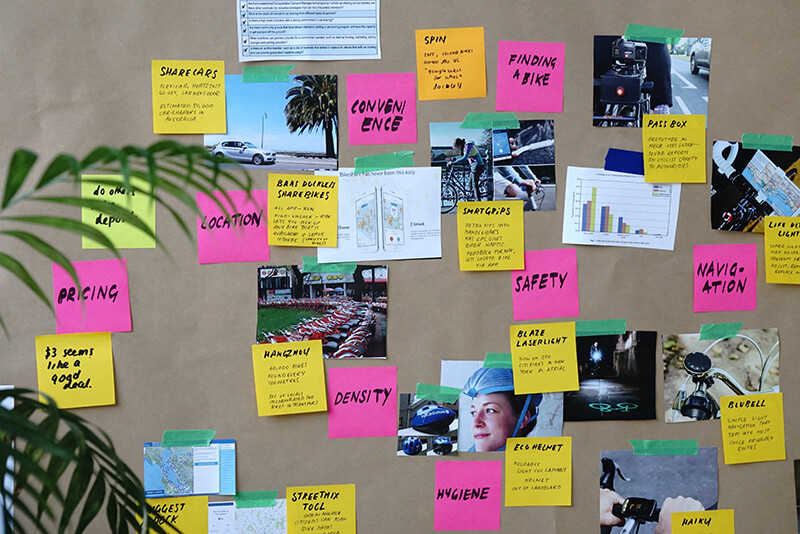
250 Research Topics For College Students That Will Get Your Brainstorming Juices Flowing

Looking for a big list of research topics for college students? You’ve come to the right place.
With a world of options at your fingertips thanks to the internet, it’s easy to fall victim to “overwhelmed with options” syndrome. It’s exhausting to try to narrow down something to write about, especially when your professor gives you a lot of creative freedom to choose your own topic.
Instead of staring at your course syllabus hoping an idea will jump out at you, let us help you make a decision that will save you a lot of time and effort. Keep reading to take a look at our master list of 250 research topics for college students to get some serious inspiration, no matter what subject or field you’re studying. Whether you need to write a research paper, put together a speech, create a presentation, write an essay, or develop a report, we have topics here that can help you narrow down a good opinion, idea, or argument.

Research is Always Important
Knowing how to do proper research is an important skill to have in both your academic and professional careers. No matter what you do, at some point in your life you’ll need to be able to take a topic, analyze the information, and put together a conclusion about it.
During your academic career in college or university, you will need to be able to do research whenever you need to do any written assignments. Quality research and credible references are always the backbone of any academic writing project.
Once you graduate, the work won’t always be over. There are many different reasons you may need to do some research in your professional career. If you’re going to start a business, you’re going to need to know how to do research and analysis. Likewise, if you want to work in marketing and advertising, digital media, journalism, the sciences, health care, or another professional industry like the legal field or social work, you’re going to be doing a lot of research in the future. In fact, there aren’t many job industries that won’t require some type of research at some point in time.
The bottom line is that research is always going to be important, and knowing how to find good research material, narrow down a good research topic, and analyze the data are always going to be important skills you need to have.

Choosing the Right Subject For Your Assignment
Finding good research topics for college students comes down to a few different factors. You want to make sure that the subject you choose checks off the right boxes. Otherwise, you’ll be stuck doing a lot more work than you planned, and no one wants to be doing that.
● Interest level: First and foremost, your topic should be something you are actually interested in. It’s really hard to motivate yourself to research and write something if you don’t care about it in the first place. Additionally, how are you going to get your audience interested in something if you don’t care about it?
● Background knowledge: What do you already know about your topic? Even if you just have a small idea or opinion about something, that little bit of background information will help you as a foundation for the research process.
● Audience: You have to keep in mind the audience you’re going to be writing or speaking to. Is this something that’s going to be interesting to them? When you’re doing research for a specific class, make sure that the topic is covered in that class. Otherwise, no one is going to care what you have to say.
● Available information: Make sure there’s enough research material out there for the subject or topic you choose. The last thing you want to do is spend hours sifting through sources just to find that you don’t have enough information to actually do your assignment.

250 Powerful Research Topics For College Students
Ready to figure out what research topics you’re going to try out? Check out our massive list below. Each of these research topics will be a great starting point for brainstorming, breaking down arguments, and making connections to other concepts.
For specific paper topics, check out our other master lists of 200 informative speech topics or 100 argumentative essay topics. Our team of experts has put together some amazing references for you so you can always find something that works for your assignment.
Once you’ve figured out which topic you’d like to use, keep reading to learn how to find good research and sources, start putting together an idea or opinion, and start working on your project.
Ancient History Topics (Pre-History to 476 A.D.)
1. Ancient Greek society
2. Mesopotamia and the origins of human civilization
3. Ancient Egyptian society
4. Cave drawings and the first methods of communication
5. Central Asian societies in the ancient world
6. Burial practices in ancient cultures
7. The Gupta Empire
8. The Maya civilization
9. Prehistoric North America (Native American and Indigenous peoples)
10. The Silk Road and the origins of trade
11. The Iron Age
12. The Bronze Age
13. The Out of Africa theory
14. Dinosaurs
15. Celtic history and origins of the celts
16. The Chinese Book of Han
17. Ancient Japanese cultures and societies
18. The ancient Persian Empire
19. The Trojan War
20. Ancient mythology
Post-Classical And Medieval History (477 to 1499)
21. The Aztec Empire
22. The fall of the Western Roman Empire
23. The Holy Roman Empire
24. Medieval castles and their monarchies
25. Technological advancements in the Middle Ages
26. Islamic rule in India and Africa
27. Timur’s invasion in India
28. The rise of the Ottoman Empire
29. The gold trade of Africa
30. The Byzantine Empire
31. The rise of the Catholic Church
32. Medieval leaders, knights, and warriors (William Wallace, William the Conqueror, Charlemagne, King Arthur, Joan of Arc, etc.)
33. The Black Death in Europe
34. The fall of Constantinople
35. Genghis Khan and the Mongol Empire
36. The Crusades
37. Medieval writers, thinkers, and creators (Dante Alighieri, Petrarch, Homer, Marie de France, Margery Kempe, Johann Gutenberg, etc.)
38. The Hundred Years’ War
39. Gothic architecture
40. Medieval medicine and healing practices
Early Modern and Modern History Topics (1500-Present)
41. Conquest of the Americas
42. Martin Luther and the 99 Theses
43. The Scientific Revolution
44. The Salem Witch Trials
45. The Age of Discovery
46. Early modern writers, thinkers, and inventors (Leonardo DaVinci, Michelangelo, Galileo Galilei, William Shakespeare, Isaac Newton, Thomas Hobbes, John Locke, Benjamin Franklin, Thomas Edison, etc.)
47. Renaissance art and discovery
48. The French Revolution
49. The British monarchy
50. The American Revolution
51. The Age of Enlightenment
52. The Irish War of Independence
53. The Victorian Era
54. The Atlantic Slave Trade
55. Military generals in the American Civil War
56. World War II
57. The Civil Rights Movement
58. The Vietnam War
59. Operation Desert Storm
60. 9/11 and global terrorism
English and Literature Research Topics For College Students
61. Symbolism in literature
62. Classic literary authors (Jane Austen, Ernest Hemingway, F. Scott Fitzgerald, Charles Dickens, Edgar Allan Poe, Victor Hugo, Jules Verne, H.G. Wells, etc.)
63. Mythology as/in literature
64. Romance and sexuality in literature
65. Dramatic irony in literature
66. Literature as propaganda
67. LGBTQ2+ Literature
68. The hero’s journey in fiction
69. Character archetypes
70. Old English language and literature
71. Genres of fiction (fantasy, horror, science fiction, historical fiction, romance, etc.)
72. Utopian and dystopian depictions in literature
73. Good vs. evil in literature
74. Native American literature and storytelling
75. Religious literature
76. Feminist and women’s literature
77. Children’s literature
78. Black literature and literary voices
79. Literary devices and analysis
80. Literary criticism
Music, Film, and Pop Culture Topics
81. Movie adaptations of books
82. Symbolism in film
83. Prolific directors and their work (Quentin Tarantino, Martin Scorsese, Christopher Nolan, Woody Allen, Steven Spielberg, Stanley Kubrick, Tim Burton, James Cameron, etc.)
84. Violence in film and television
85. Stereotypes in popular culture
86. Music genres and their associated sub-cultures
87. The role of music and song in activist movements
88. Jazz in New Orleans
89. Cinema scores and compositions
90. Classical Hollywood cinema
91. Soap opera dynasties
92. Spaghetti Western films
93. Streaming services and the music industry
94. Portrayals of superheroes in movies and television shows
95. “Fandom” culture
96. Gender equality in Hollywood
97. Legendary actors, bands, and musicians
98. Paparazzi and celebrity worship
99. Reality television shows
100. Satire in film and television
Current Affairs and Human Rights Topics
101. Immigration policies, practices, or laws
102. Women’s rights
103. Activist movements such as Black Lives Matter, Everytown For Gun Safety, Time’s Up, or the School Strike For Climate
104. Animal rights or animal cruelty
105. The United Nations
106. Gun safety and control policies
107. Climate change
108. Rural and urban poverty
109. Homelessness
110. Global or national terrorism
111. Modern warfare practices
112. Multiculturalism and nationalism
113. The crisis in Syria
114. Global peacekeeping
115. China’s One Belt One Road project
116. Urban slums in third world countries and developing nations
117. Capital punishment
118. Domestic violence
119. Disability and human rights
120. Internal displacement of Indigenous populations
Research Topics For College Students Studying The Sciences
121. Natural disasters
122. Climate change
123. Future predictions based on patterns and data
124. Animal populations
125. GMOs
126. Organic farming
127. Darwinism
128. Space exploration
129. Ecological conservation
130. Amino acids
131. Molecular biology
132. Genetic engineering
133. Cloning
134. Stem cell research
135. Dark matter
136. Hormone regulation
137. Plant life
138. Black holes in space
139. The Higgs boson
140. Cloud formation and weather patterns
Medicine, Nursing, and Health-Related Subjects
141. Vaccines
142. Homeopathic medicine and natural medicine
143. Health care reform
144. Diseases
145. Caring for the elderly
146. Failure-to-thrive infants
147. Cardiovascular care
148. Child care
149. Hormone replacement therapy
150. Neonatal nutrition and care
151. Sun safety and awareness
152. Women’s health care issues
153. Men’s health care issues
154. Transgender health care issues
155. Reconstructive surgery
156. Plastic surgery
157. Exercise and physical health
158. Nutrition and food
159. Catastrophic injuries
160. Acupuncture
Sociology and Psychology Research Topics
161. Cults
162. Class conflict and inequality
163. Phobias
164. Abnormal psychology
165. Autism and diagnosis
166. ADD and ADHD
167. Other mental illnesses (bipolar disorder, schizophrenia, depression, anxiety, psychosis, OCD, PTSD)
168. Cultural connections with food
169. Family relationships
170. Addiction and substance abuse
171. Divorce
172. The nuclear family
173. Gender roles and equality
174. Youth culture
175. Social media and modern networking
176. Freud’s theories
177. Fad dieting
178. Eating disorders
179. Nonverbal communication
180. Social cognition
Law and Politics Research Topics
181. Voting and election reform
182. Administrative law
183. Personal injury law
184. Business and Corporate law
185. Aboriginal self-governance
186. Law reform
187. Landlord and tenant issues
188. Self-representation in court
189. Youth justice
190. Legal aid
191. Refugees and asylum seekers
192. Landmark court decisions (Roe v. Wade, R v. Brown, Plessy v. Ferguson, Brown v. Board of Education, etc.)
193. Censorship laws
194. Privacy laws
195. Discrimination and hate crimes
196. The Supreme Court
197. Family law
198. Criminal law
199. Citizenship and immigration
200. The United States electoral college
Education-Based Research Topics For College Students
201. Boarding schools
202. Sexual education
203. Education access
204. Digital literacy in the classroom
205. Standardized testing
206. STEM education
207. Plagiarism
208. College athletes
209. Free tuition
210. Home schooling
211. Religious-based education
212. Charter schools
213. Accessible education for disabilities
214. Sororities and fraternities in the United States
215. Teachers’ unions
216. The No Child Left Behind Act
217. Early childhood education
218. Native American education
219. International students and studying abroad
220. Student mental health
Technology, Media, and Computer-Related Topics
221. Bitcoin and online currency
222. Artificial intelligence
223. Technological developments
224. Social media
225. Smartphones
226. Cyberbullying
227. The Dark Web
228. Internet crimes
229. Self-driving cars
230. Internet privacy
231. Internet ownership
232. Technology and intimacy
233. Online scams
234. Ecommerce business
235. Website development
236. Graphic design
237. Drone technology
238. Information storage
239. Cloud-based computing
240. Servers and hosting networks
Marketing and Advertising Research Topics
241. Digital marketing
242. Behavioural targeting
243. Super Bowl commercials
244. Marketing and sales funnels
245. The buyer’s journey
246. Content marketing
247. Search engine optimization (SEO)
248. Gender stereotypes in advertising
249. Children’s advertising
250. Business fraud

How to Break Down Your Research Topic
Once you’ve chosen a broad topic from the list of research topics for college students, you still have a bit of work to do. Now, it’s time to form an argument and zero in on a specific subject or sub-topic you’d like to work with.
Examine the 5 Ws (who, what, where, when, and why):
● Who is/was involved? Background information will always give you some insights, such as the cause of an event or the purpose of a subject, and who it will primarily affect.
● What is the message? What happened? An overlying message, lesson, or value is almost always present regardless of what subject you’re studying. For literature topics, this might mean the messages that are conveyed within the text, or the overlying theme you’d like to explore. With history topics, this can refer to the events that took place, and what happened during this time.
● Where did this story, event, or topic take place, or where does it have an impact? For example, when using science-related topics such as natural disasters, this could mean the geographical areas where the disasters occur. If you’re talking about politics, you would want to focus on the areas where certain laws or policies have an impact.
● When did, does, or will this event take place? History topics will usually be about when an event took place, but if you’re working on a topic about literature, for example, you could talk about when the text was created. Background and context is always important for most subjects, and usually provides insight into the deeper meaning or significance of something.
● Why is this significant? In other words, why are we still talking about this particular topic? Is there something we should know about for the future? For example, if you’re focusing on climate change, your audience would need to know why this is significant so they can help to take action for the future.
Think about the broader connections of a subject and how it relates to the world. Are there lessons we can learn from these topics? What do they mean for society? What specifically interests you about these topics that you can break down into more specific subject areas?

How to Find Quality Research Material
When it comes to utilizing good research topics for college students, university students, or even working professionals, everything is going to come down to being able to source good research material. With research, everything is about quality.
Here are some places you can look to find credible, reliable, and peer-reviewed sources:
● Your school library or its website
● Free databases such as PubMed, EBSCO, and Academia
● The source and citation list at the bottom of Wikipedia entries (NOT the Wikipedia article itself)
● Case studies in the industry
● Government archives for primary sources in a specific country
● Citations in academic articles
Stick to the type of sources listed above to make sure that you are always providing quality evidence, information, and data. Be sure to avoid this list of unacceptable references, sources, or research materials:
● Wikipedia
● Other online encyclopedias
● User generated content on platforms such as YouTube, Facebook, Reddit, etc.
● Blogs or opinion articles
● Consultant websites
● Organization or corporate websites (heavy use of bias)
● Question and answer websites or chat forums
● Personal web pages
● Self-published books

The Importance of Referencing Your Work
Any time you’re going to use any material or information from your sources, make sure you provide proper references. List out your references whenever you find an idea, even if you’re not sure if you’re going to use it yet. This will help you when it comes time to start writing.
It’s always better to be safe than sorry when it comes to plagiarism. Add a citation for every idea or piece of information you use if you don’t consider it to be common knowledge. Be very careful with what you determine to be common knowledge, and always make sure you cite direct quotations at all times.
As a general guideline, the OWL At Purdue states that anything you see written in a credible source at least five times or more is usually safe to consider common knowledge. Again, be very careful with this. Just because you think something is common knowledge doesn’t mean that it actually is common knowledge to your specific audience – or more importantly, to your professor. For example, it’s common knowledge that there is a large population of homeless people in New York City, but it’s not common knowledge that, as of May 2020, there are approximately 59,308 homeless people in New York City. See the difference?
Learn more about referencing styles, avoiding plagiarism, and finding good sources in our free ebook, Making the Grade: A Guide to Essay Writing Like a Pro. This 150+ page book is packed with all the tips and advice you’ll ever need to write an amazing academic essay, regardless of what course you’re taking.

Don’t Feel Like Doing the Research? Let us Help
If you didn’t feel like looking through our master list of research topics for college students, we don’t blame you. There’s a lot of information here to process, and sometimes just the idea of digging through piles of research can be daunting enough to make you want to close your books forever.
When times get too tough, you can always turn to us. Homework Help Global provides custom essay writing services, as well as many other services such as editing, proofreading, presentations, and tutoring. All of our essays are written specifically for you based on your assignment details and instructions, are free from plagiarism, and are thoroughly researched by our team of scholars and academics.
Get a free quote now or place your order to get started, and we’ll get you set up with an expert in your field who can handle the work for you.
Share:

